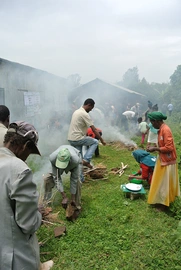Combating malnutrition and land scarcity in Ethiopia by cultivating leafy vegetables in Ethiopia: ZEF’s NutriHAF project publishes manual at final project stage
April 19, 2018.
At its final project workshop in Addis Ababa on March 22-23, 2018, ZEF’s NutriHAF project launched a booklet titled “<link https: www.zef.de fileadmin webfiles downloads projects nutrihaf nutrihaf_vegetable_booklet_final.pdf external-link-new-window internal link in current>Vegetable species for multi-storey cropping systems and human nutrition” in English and in the<link https: www.zef.de fileadmin webfiles downloads projects nutrihaf nutrihaf_vegetable_booklet_afaan_oromo_final.pdf external-link-new-window internal link in current> local language Oromifa.
The booklet transfers research findings as a manual for the cultivation of a number of leafy vegetables under shade, including cowpea, pumpkin, amaranth and jute mallow. The manual also contains important information about the nutritional advantages of these vegetables. It is not only available in English but also in the project region’s local language Oromifa. The booklet was therefore highly appreciated by the Ethiopian farmers participating in the workshop. The project also conducted training sessions on how to prepare food for farmers and consumers.
Diversification of agriculture increases farmers' resilience and nutrition variety
“The German-Ethiopian research and NutriHAF project team has been working for the past three years in biodiversity hotspot areas in Ethiopia and Madagascar”, tells project leader and ZEF senior researcher Dr. Jochen Dürr. “Our main goal was to contribute with our research to combating malnutrition and land scarcity. To achieve this we have, in close cooperation with our local partners, been introducing leafy vegetables into multi-storey cropping systems so as to increase the diversification of agriculture. Diversification is important to increase farmers' resilience to for example weather shocks or failed harvest on the one hand and to combat malnutrition and unbalanced diets on the other", Dürr explains.
NutriHAF’s participatory approach combats malnutrition and tackles land scarcity
NutriHAF is a German/Ethiopian participatory research and capacity building project which is based at the Center for Development Research (ZEF) of Bonn University, Germany, and is funded by the German Ministry for Agriculture and Nutrition. “The German-Ethiopian research team has been working for the past three years in biodiversity hotspot areas in Ethiopia and Madagascar”, says project leader and ZEF senior researcher Dr. Jochen Dürr. “By promoting diversification of agriculture and nutrition via introducing leafy vegetables into multi-storey cropping systems, NutriHAF is contributing to combating malnutrition and land scarcity”, he adds.
Well-attended workshop with Ethiopian project partners and “end-users”
More than 30 participants, including farmers from the project area, representatives from development agencies, academics from Addis Ababa University and the World Vegetable Center in Arusha, Ethiopian officials and the complete NutriHAF team (five German and seven Ethiopian colleagues) took part in the workshop in Addis Ababa. In the morning of the first workshop day research findings were presented, while in the afternoon working groups discussed the presented outcomes and proposed recommendations considering future plans, especially with regard to the sustainability of the project’s achievements. The highlight of the day was the release of the above mentioned booklet.
Success stories
One of the main successes is that acceptance among the farmers of the vegetables introduced by the NutriHAF project is high. Farmers like the taste of the recipes developed by the project, and would continue to cultivate vegetables, as long as seeds are available. The effect of integrating the vegetable leaves introduced by NutriHAF into the daily diet is best described with the words of Hussein, a farmer from Yayu, stating: “Since I have been cultivating these crops and my family and I have been eating them, we are healthy and have no more illnesses”.
Project’s sustainability and way forward
The main challenge of the project is to make its achievements sustainable or, to put it differently, “how the project can leave a footprint?” Strategies for scaling-up such as strong farmer-to-farmer networks and a well-functioning extension system, distribution of high quality seeds and training of cultivation practices are necessary. It is also essential that officials at regional and national level will be convinced of the importance of vegetable production. Only then it is assured that the extension workers at local level will receive sufficient support which is needed to promote vegetables in multi-storey cropping systems and along the whole value chain until it reaches the food plate of all household members. These are the points the project is going to focus on during the remaining few months.
For photos look into the <link http: blog.zef.de external-link-new-window internal link in current>ZEF blog post.



